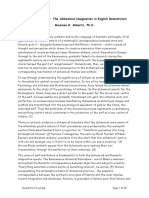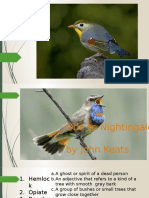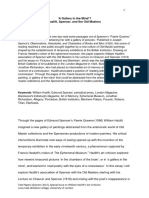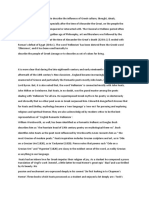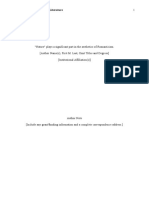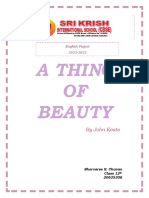Class XII
Mid term Revision 7
Questions
How do ‘Indigo’ by Louis Fischer and ‘The Roadside Stand’ by Robert Frost, highlight the
theme of exploitation, and what similarities do they reveal about the plight of
marginalised communities?
Ans- Both "Indigo" by Louis Fischer and "The Roadside Stand" by Robert Frost explore
how powerful groups exploit marginalized communities for their own benefit.
In "Indigo," Fischer shows how British landlords forced Indian peasants to grow indigo,
paying them unfairly low prices. The farmers suffered while the British profited.
Similarly, Frost's poem depicts rural people selling goods at roadside stands, hoping city
dwellers will buy from them. However, wealthy people ignore them or exploit their
desperation. Both works show how the powerful take advantage of the weak - whether
through colonial exploitation or economic inequality. The marginalized communities in
both texts struggle for basic survival and fair treatment. These literary works reveal that
exploitation transcends time and geography, affecting vulnerable communities
everywhere.
Questions
Based on what Keats’ suggests in ‘A Thing of Beauty,’ how can recognising the
lasting value of beauty help someone in the real world cope with challenges or
difficulties?
Ans- Keats portrays beauty as something that ‘will never pass into nothingness,’ implying
that, unlike fleeting material comforts, beauty offers lasting emotional and
psychological support. In the real world, during times of hardship, turning to the
enduring beauty of nature, art, or meaningful experiences can provide a sense of peace
and restoration
Questions
What spreads the pall of despondence over our dark spirits? How is it removed?
Ans- John Keats says that pain and suffering are a part of life. These bring us sadness and
despondence. But still, we can find hope. The hope and motivation come from
nature and remove the pall of despondence from our spirits. The beautiful sights give us
inspiration to continue the journey of life.
Questions
The government and other social service agencies appear to help the poor rural people
but do them no good. Pick out the words and phrases that the poet uses to show their
double standards.
Ans- In "A Roadside Stand," Robert Frost uses specific words and phrases to expose the
government's double standards toward poor rural people.
The word "beneficent beasts of prey" reveals their true nature - they seem kind but are
actually predators who harm the poor while pretending to help. He uses the phrase
"greedy good-doers" to show their fake concern - they appear helpful but actually want
something for themselves. The poet also uses "soothe them out of their wits" to show
how officials manipulate simple rural folk with false hope, keeping them confused and
dependent while doing nothing meaningful to improve their lives.
Questions
And such too is the grandeur of the dooms
We have imagined for the mighty dead;
All lovely tales that we have heard or read:
An endless fountain of immortal drink,
Pouring unto us from the heaven’s brink.
i. Write the theme which is best represented in the given extract.
Ans- The theme that is best represented in this extract is the immortalizing power of
beauty and imagination.
Questions
And such too is the grandeur of the dooms
We have imagined for the mighty dead;
All lovely tales that we have heard or read:
An endless fountain of immortal drink,
Pouring unto us from the heaven’s brink.
ii. Read the assertion and the reason below, with reference to the given extract.
Assertion : The poet suggests that the tales of the mighty dead inspire us and provide eternal beauty.
Reason : These tales are compared to an endless fountain of immortal drink, which pours from heaven,
symbolizing the eternal nature of inspiration.
Choose the correct option regarding their relationship :
(A) Both the assertion and the reason are true, and the reason is the correct explanation of the assertion.
(B) Both the assertion and the reason are true, but the reason is not the correct explanation of the assertion.
(C) The assertion is true, but the reason is false.
(D) The assertion is false, but the reason is true.
Questions
And such too is the grandeur of the dooms
We have imagined for the mighty dead;
All lovely tales that we have heard or read:
An endless fountain of immortal drink,
Pouring unto us from the heaven’s brink.
iii. Complete the following suitably.
The “endless fountain of immortal drink” is an apt analogy for the tales of the mighty dead because _____.
iv. Select the correct option from those given in brackets, to fill in the blank.
The use of the word “brink” in the extract suggests that the immortality that is being poured onto us is on
the verge of overflowing. This creates a powerful image of _____ (scarcity/abundance).
v. Based on the poem rhyme scheme, evident in lines 2-5, of the given extract, which word
would rhyme with line 1?
said think tombs
Questions
Keats feels that Nature binds us to the Earth. How does he justify this statement?
Ans- Keats believes Nature connects us to Earth through its constant beauty and comfort. He shows how
natural things like trees, flowers, and streams provide us with joy and peace during difficult times. Nature
acts like a loving bond that keeps us grounded and gives us reasons to appreciate life, making us feel deeply
connected to our earthly home through its endless beauty.
Questions
Do we experience things of beauty only for short moments or do they make a lasting impression on us?
Ans- According to Keats, things of beauty make a lasting impression on us, not just short moments. Beautiful
experiences stay in our memory and continue to bring us joy long after we first see them. Like an "endless
fountain," beauty keeps flowing into our lives, providing continuous happiness and comfort that never fades
away.
Questions
Bring out the contrast between the urban rich and the rural poor.
Ans- In "A Roadside Stand," Frost contrasts wealthy city people who speed by in cars, ignoring the
roadside stand, with poor rural farmers who desperately need money. The rich urbanites are selfish and
uncaring, focused only on their comfort, while the rural poor struggle daily for basic survival, hoping
someone will stop and buy their simple goods to help them live.
Questions
Imagine a child from the farmer’s family migrates to the city for their education. As the
child, write back to your family telling them whether you would or would not want to
turn into a city person.
Use the context of the poem “A Roadside Stand” in mind to pen down this letter.
You may begin this way:
12, Davidson County
23 January ‘XX
Dear mom
I have been thinking about the roadside stall lately. Now that I find myself surrounded
by city-people all the time, I think……………………………………..
With love
Jennifer







































































